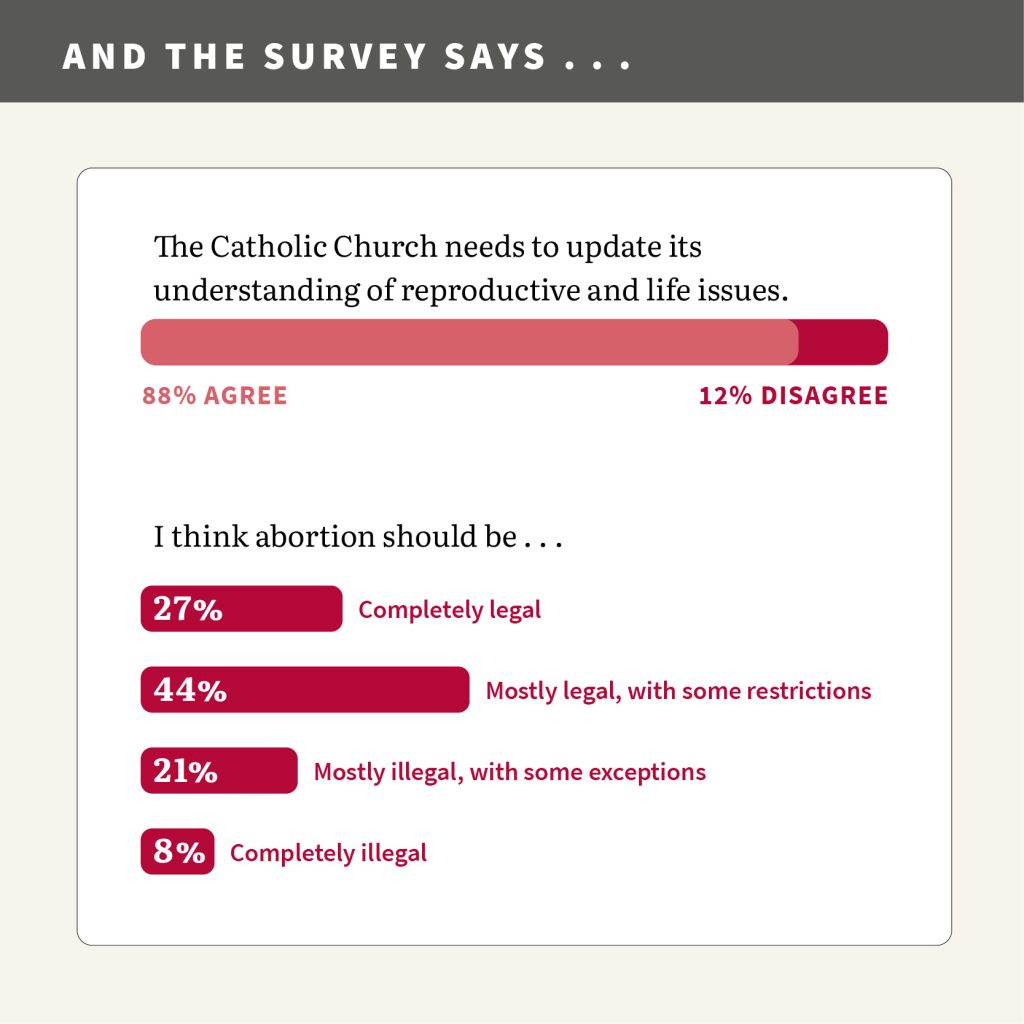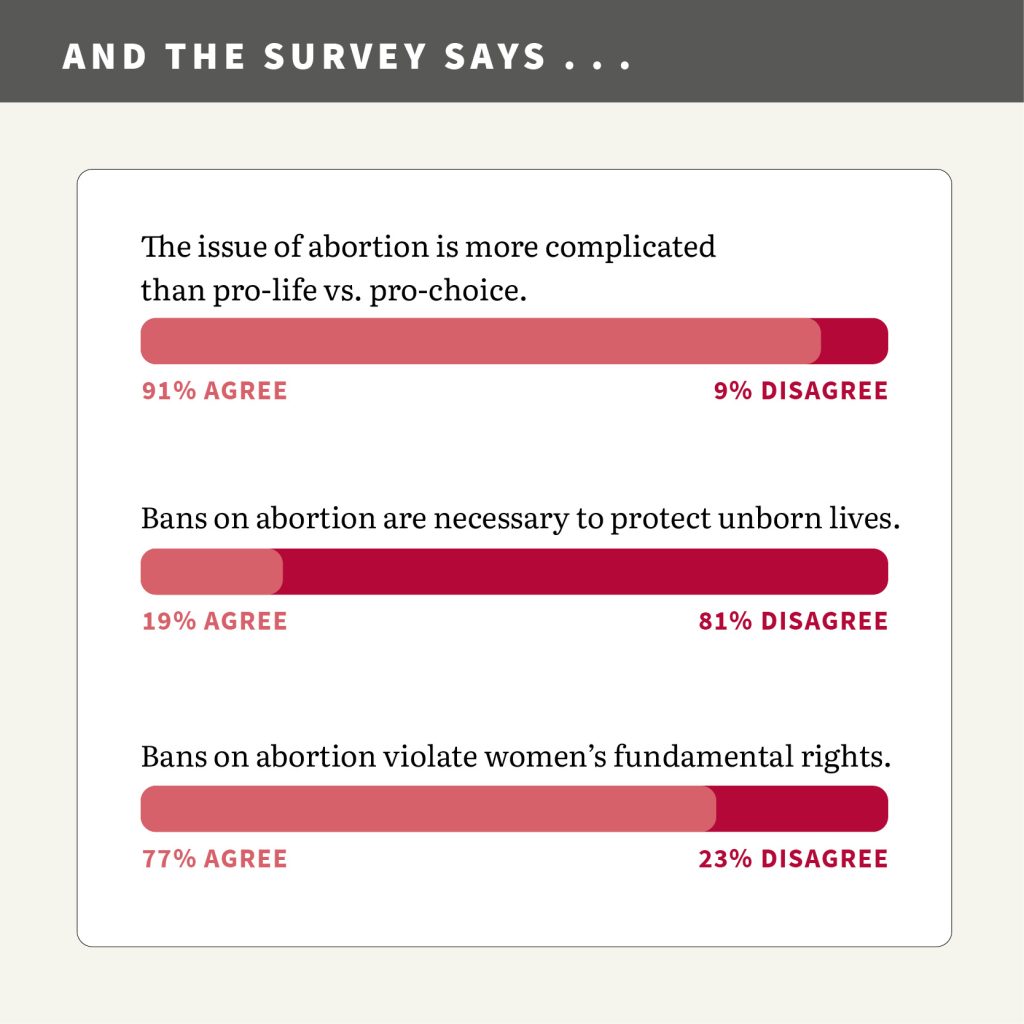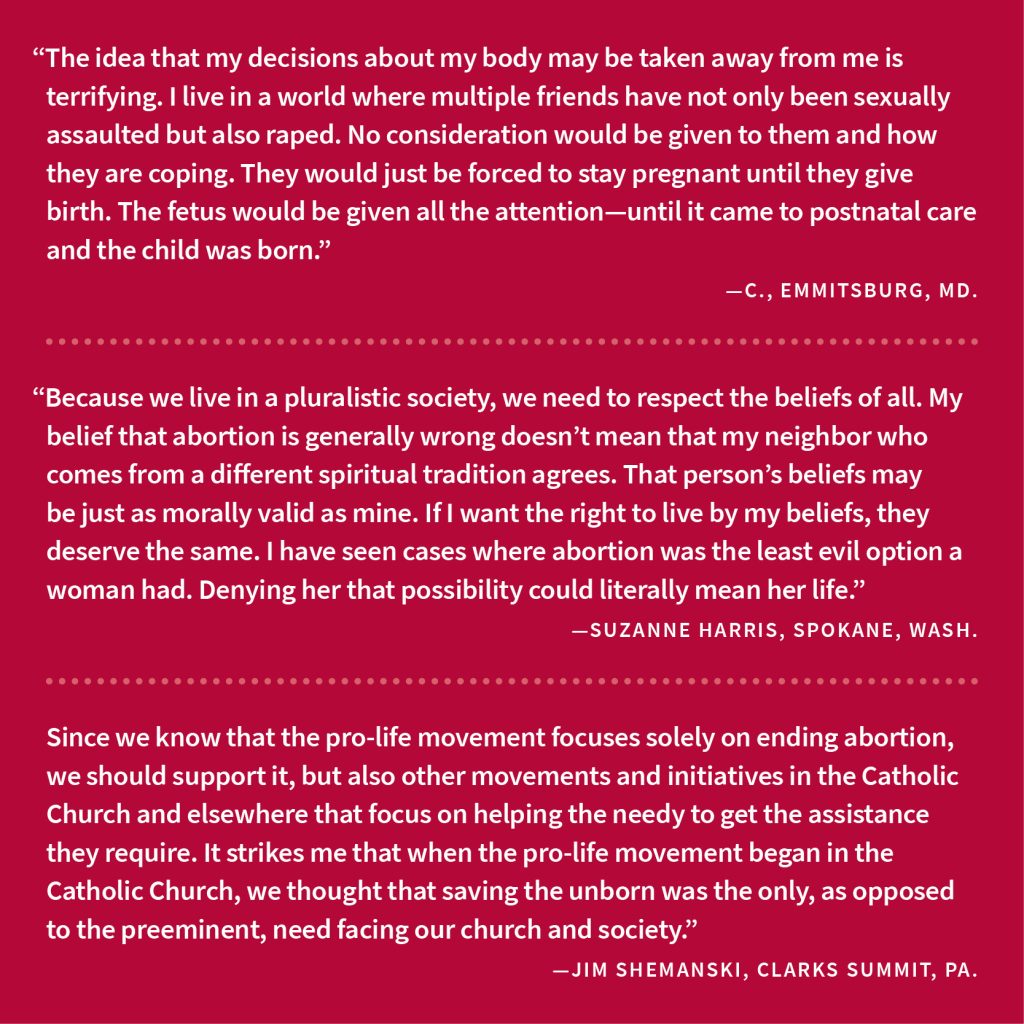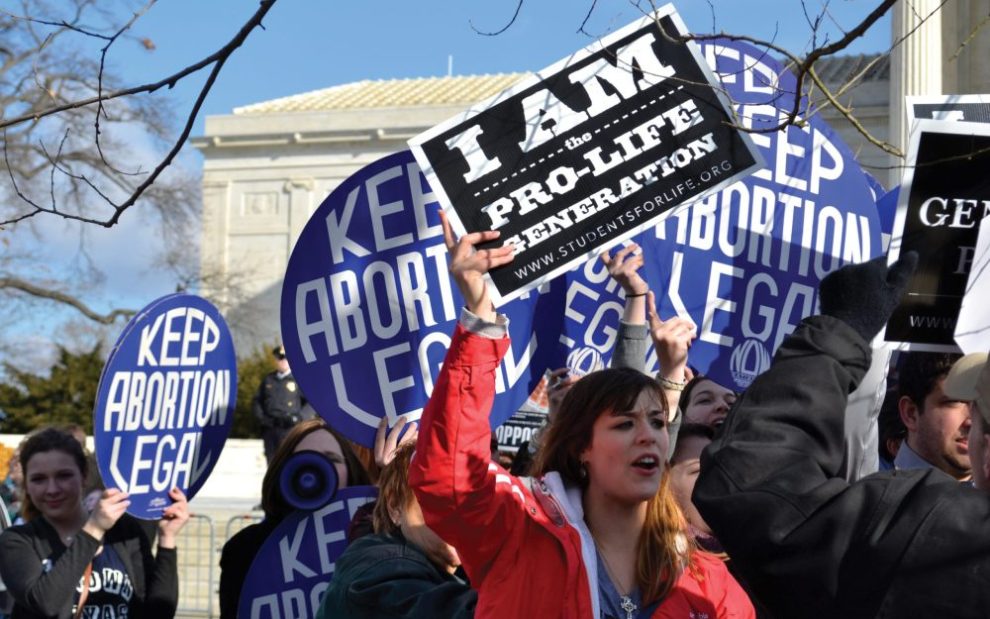For our Sounding Board column, U.S. Catholic asks authors to argue one side of a many-sided issue of importance to Catholics around the country. We also invite readers to submit their responses to these opinion essays—whether agreement or disagreement—in the survey that follows. A selection of the survey results appear below, as well as in the January issue of U.S. Catholic. You can participate in our current survey here.

In the fall of 2016, I logged onto Facebook and saw a post from my dear friend—the godmother of my children—that really threw me: “I hate that abortion happens,” she wrote before continuing, “but I am pro-choice.” She listed all of her reasons, from the broken foster care and adoption systems in the United States to maternal health care shortcomings—bad for women all around but abysmal for Black women. There were many reasons, but at the time, I only noticed those bold words at the beginning: I am pro-choice. I didn’t understand it. How could the godmother of my two toddlers—the future godmother of the baby growing inside me—be OK with abortion? Are pro-life and pro-choice values compatible?
Until that time, I was a single-issue voter. Granted, I was not old enough to have voted in many elections prior to that, but that’s somewhat beside the point. I was taught from a young age that abortion is the “preeminent issue” for Christian citizens. I could not understand how people on the left, priding themselves on organizing around justice issues, could overlook the killing of the unborn. While I knew I could not vote for Donald Trump due to his myriad moral shortcomings, I also could not vote for a Democratic candidate because, I thought, Democrats were pro-abortion.
Recently, Pope Francis advised Catholics to “choose the lesser evil” in the recent U.S. presidential election, explaining that both candidates were against life: “the one who throws out migrants and the one who kills children.” His comments seem to permit a vote for a politician who favors abortion rights by equating failing to welcome migrants with abortion—if both are equally illicit, then neither candidate has a claim on being pro-life. For many Catholics, this is new.
For my part, my friend’s Facebook post had got me thinking, and not long after that I began working with a group of religious sisters who helped me widen the scope of my vision on the abortion issue. What I have learned in the interim is worth sharing, not least because—though I am grateful for the pope’s insistence that abortion and migration are both equal life issues—his comments contributed to the undernuanced and inflammatory language that problematically shapes Catholic discourse on abortion, and they obscured the bodies of pregnant women.
First, let’s clarify: Kamala Harris, who Pope Francis referenced in these remarks, or any Democratic political candidate is not “one who kills children.” Permitting abortion is very different from compelling women to get abortions and often saves lives. Pregnancy is a deeply personal experience, with complex and often dangerous effects on the body of the pregnant woman. Holding policy positions that permit particular women in particular circumstances to determine, in conversation with their doctors and families, what will be good for their particular bodies, is not to kill children but to affirm the embodied dignity of women.
Though we might grieve abortions and even object to those that are not medically necessary, we should remember that they are not mandated by politicians. On the other hand, for example, actively harming migrants and their families through mass deportation, separating families and placing them in cages, and lying about migrants for political gain does indeed directly endanger people and violate human dignity.

Importantly, our tradition holds that the right to life entails the right to bodily integrity and calls violations of bodily integrity “intrinsically evil.” Bodily integrity does not depend on the right to life but is an integrated feature of it—this is why there are moral standards regarding care for a corpse. Our bodies are supposed to matter. In light of this, female bodily integrity cannot be an afterthought. It is an intrinsic good and must be treated as such, which will necessitate a nuanced approach to abortion that both affirms the embodied dignity of women and upholds the life of the unborn.
There is a way to do both. By implementing policies that protect women, eradicate poverty, ease social inequity, foster healthy environments, and promote maternal health care and education, women are empowered to choose life. Studies show that such social support measures are far more effective at reducing abortion rates than legal prohibitions; in fact, when Barack Obama was president, the abortion rate fell below pre-Roe levels—only to rise again during Donald Trump’s first presidency. Indeed, in countries with more stringent abortion laws, abortion rates tend to be higher than in countries with more permissive laws.
In other words, Democratic policies are much more likely to reduce abortion than Republican laws. Rather than “killing children,” these policies are saving them—born and unborn. If abortion is the preeminent priority, this is surely worth acknowledging.
Some might argue that it’s the principle of the thing: Regardless of the actual outcome of abortion legislation—even if maternal mortality increases, abortion rates rise, and the entire political landscape is distorted to fit an anti-abortion agenda—restrictions on abortion are important because they affirm the dignity of the unborn and recognize their personhood. In this way, the argument goes, the issue is much like slavery, and those against abortion rights are modern-day abolitionists.
Here’s one reason why that argument fails: Slavery is a violation of human dignity because every person is an end, not a means; no one has the right to own another human person or use them for their own good. Advocating against slavery, then, was advocating to remove the arbitrary domination of one race over another and restore the freedom to which every person is entitled. When it comes to abortion, every person has the right to bodily integrity—the right to decide what or who gets access to their body; the right of their body to be an end, not a means—except pregnant women. Abortion rights are not sought as arbitrary power, but as a way of acquiring the rights to which all people are entitled.
This is not to say that a woman’s right to bodily integrity automatically overrules the rights of the unborn; rather, it is a plea for a more nuanced conversation around abortion. Perhaps recognizing the intrinsic good of female bodily integrity will equip us to use moral persuasion to encourage women to embrace the responsibilities that come with the right to make choices about their bodies. Perhaps recognizing that abortion is more effectively reduced by social support measures will help us avoid falling into the single-issue trap that has led to so much political discord. At the very least, we can avoid labeling politicians who uphold reproductive rights as anti-life and instead appreciate the efforts that save women and the unborn. If all life is equally sacred, that must include pregnant women.
The lesser evil logic doesn’t apply here. Sometimes, there is a way to pursue the good, even as we recognize there is always more work to be done.

Survey results are based on responses from 103 uscatholic.org visitors.
This article also appears in the January 2025 issue of U.S. Catholic (Vol. 90, No. 1, pages 25-29). Click here to subscribe to the magazine.
Image: iStock/DJMcCoy














Add comment